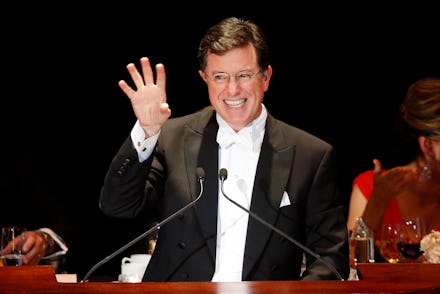Stephen Colbert Perfectly Explains Why We Should All Boycott Amazon

The Colbert Nation is coming for Amazon.
On Wednesday night, Stephen Colbert fired shots at the world's largest online retailer over its ongoing war of attrition with book publisher Hachette. Amazon shoppers hoping to buy and preorder works by the likes of J.K. Rowling, Malcolm Gladwell and Colbert himself have instead found weeks-long shipping delays, out-of-stock notices, higher prices and even advice to buy Hachette titles secondhand. Behind the scenes, Amazon and Hachette are facing off over ebook contracts and how much Amazon can slash costs on Hachette titles. In front of the camera and through his fans' keyboards, Colbert is fighting back.
This has been coming for a while. Given that it's responsible for 65% of new book purchases online, Amazon's well-documented bullying tactics are taken as a fact of life in the publishing world. Authors, especially new and mid-list writers, live and die by their Amazon rankings and sales. And with the increasing lack of competition from other booksellers, consumers are losing other options for acquiring books, which has unsettling implications for the future of ideas. The New Yorker went so far as to publish a long exposé earlier this year asking whether Amazon is good for books. (Spoiler alert: It says the answer is no.)
Hachette isn't some scrappy underdog either: Amazon has picked this fight with the third-largest publisher in the world, and publishing has its own internal demons. But this showdown affects more than 5,000 titles. It isn't like the time Amazon de-listed books from a smaller publishing house over an ebook pricing dispute, or that time queer-themed books vanished from Amazon searches and temporarily lost their rankings, or that other time paid copies of George Orwell's 1984 were deleted from users' Kindles. Not that Hachette's fighting weight makes those other controversies any better, but we should worry that Amazon thinks it can get away with it all.
You'd think that as the biggest name in e-commerce, Amazon could absorb some costs while ensuring that authors, consumers and companies all get what they need to survive and prosper. Even if Amazon cared about anything beyond its own bottom line (which is its primary function), it wouldn’t matter: After two decades of business, Amazon still isn't turning much of a profit. Supporters claim this is basically because founder Jeff Bezos is too awesome and too forward-thinking to care. Amazon does deserve props for understanding early on that the Internet and ebooks weren’t going to be fads. Unfortunately, we got so used to dirt-cheap products and fast shipping that we let Amazon dictate the terms of our consumption, at the cost of labor conditions, dodged taxes and the value of work itself.
We're fighting this battle on a lot of fronts right now. ISPs threaten a fundamental principle of the Internet because they're not willing to improve their own infrastructure, while prices remain high and service generally stinks. Studies find that Wal-Mart stores can actually depress local economies and replace jobs at lower wages with fewer benefits. Sprint promises "a major price war" if it successfully merges with T-Mobile, but regulators get nervous all the time about deals that eliminate competition. We can't even seem to prioritize species survival over agribusiness.
Author Chuck Wendig recognizes that Amazon is necessary, and Amazon is harmful, and Amazon helps many kinds of people, and that these statements don't cancel each other out. As a company, it's doing what it sees as best for the company. But Wendig cuts this Gordian knot with one beautifully rendered expletive: "Fuck the monoculture." Amazon can be one place to shop, but it shouldn’t be the only place you buy books. The marketplace has grown since the '90s, and there are lots of ways to get your next read without leaving your couch.
Award-winning writer Sherman Alexie takes it further, though. He teamed up with Colbert on air to encourage readers to order their books (or at least one book, debut author Edan Lepucki's California) through legendary Portland, Ore., indie Powell's. Colbert piled on the outrage, offering free downloads of printable stickers that announce "I Didn't Buy It on Amazon." Of course there's a hashtag for Colbert's new anti-bump boycott, and #CutDownTheAmazon could hit pocketbooks, though whose is not yet clear.
If authors, independent booksellers and consumers can get one over Amazon, though, voting with your dollars could become that much more satisfying.